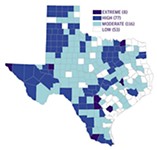Spillar Responds on Carbon Footprint
More on the Strategic Mobility Plan
By Katherine Gregor, 7:25PM, Fri. Oct. 23, 2009

In response to my last blog post, noting that council members failed to ask about the climate protection qualifications of finalist consultant teams for the city's new Strategic Mobility Plan, Austin Department of Transportation Director Robert Spillar e-mailed to clarify the importance of climate protection and sustainability.
Explains Spillar: "We know emphatically we need to do more to move away from the model of Single Occupant Vehicles – and the way to do that is to provide alternatives."
He continues, "Focusing on 'sustainability' and greenhouse gas emissions is no longer an option for any transportation organization, it is a vital consideration in our review process. Sustainability is a key component of the Strategic Mobility Plan and it is found repeatedly in the RFQ that was issued. The City Council resolution in June directly links the transportation plan to sustainability. The RFQ calls for the end product to “focus on correcting the gaps and achieving a sustainable system, long-term.”
All great to hear. However: Sustainability is a vague term that means many things to many people. Sometimes it means economic sustainability. Sometimes it means reducing carbon emissions. Sometimes it means designing something to last a long time, for a price we can afford, with a few green' elements. Sometimes it's just a buzz word, that politicians can safely support, while not being accountable to any particular hard results.
What is far more meaningful and accountable is establishing hard numeric goals for carbon reductions, with periodic reviews and binding commitments. If that's the city's intent, then it needs to explicitly state "greenhouse gas emission reductions" as a planning goal, and quantify target results, not just broadly reference "sustainability."
Here Spillar delivers some good news: "The Strategic Mobility Plan is including a carbon footprint measure as part of our evaluation and ranking system for projects. We’ve asked our consultants to bring back 'best practices' such as [those in] the Fort Worth Mobility and Air Quality study or Denver mobility plan. that had 67 measurements for quality of life."
"With the eventuality of our region going into non-attainment for air quality, it is vital that greenhouse gas (GHG) emissions be evaluated in all our projects. In fact, this was one point that was solicited from the consultant teams during their staff interviews."
He adds, "Recently, our department attended a Climate Leadership Academy in Chicago, together with [staff from] Austin Energy, Capital Metro Transit Authority, and Texas Department of Transportation representatives to identify innovative approaches to transportation, with the intent of reducing our carbon footprint. Although it wasn’t highlighted in yesterday’s discussions, climate protection and our carbon footprint is certainly an important element in any of our transportation programs."
Right. Which is why it would have been helpful to hear council members question the candidates about their qualifications to achieve that goal.
Ester Matthews, Director of the Austin Climate Protection Program, also called to offer assurances that she's been talking to the transportation department. We look forward to seeing her team's recommendations for specific greenhouse gas reduction targets, to be achieved with the Strategic Mobility Plan, based on what other leading cities internationally have achieved.
We'll be even more excited when the Strategic Mobility Plan itself includes hard number goals established for GHG emission reductions, attributable to new investments in rail transit and other multi-modal alternatives to driving.
Not to be a noodge, but – if the city's only stated goal is "sustainability," how exactly will we know we've achieved it?
Got something to say on the subject? Send a letter to the editor.
A note to readers: Bold and uncensored, The Austin Chronicle has been Austin’s independent news source for over 40 years, expressing the community’s political and environmental concerns and supporting its active cultural scene. Now more than ever, we need your support to continue supplying Austin with independent, free press. If real news is important to you, please consider making a donation of $5, $10 or whatever you can afford, to help keep our journalism on stands.
April 13, 2023
Aug. 6, 2010
July 30, 2010
Mobility, Transportation, Climate Protection










